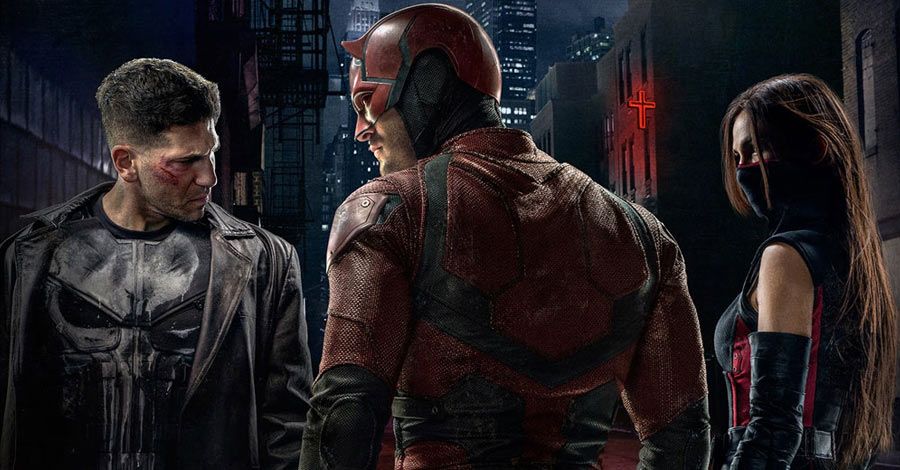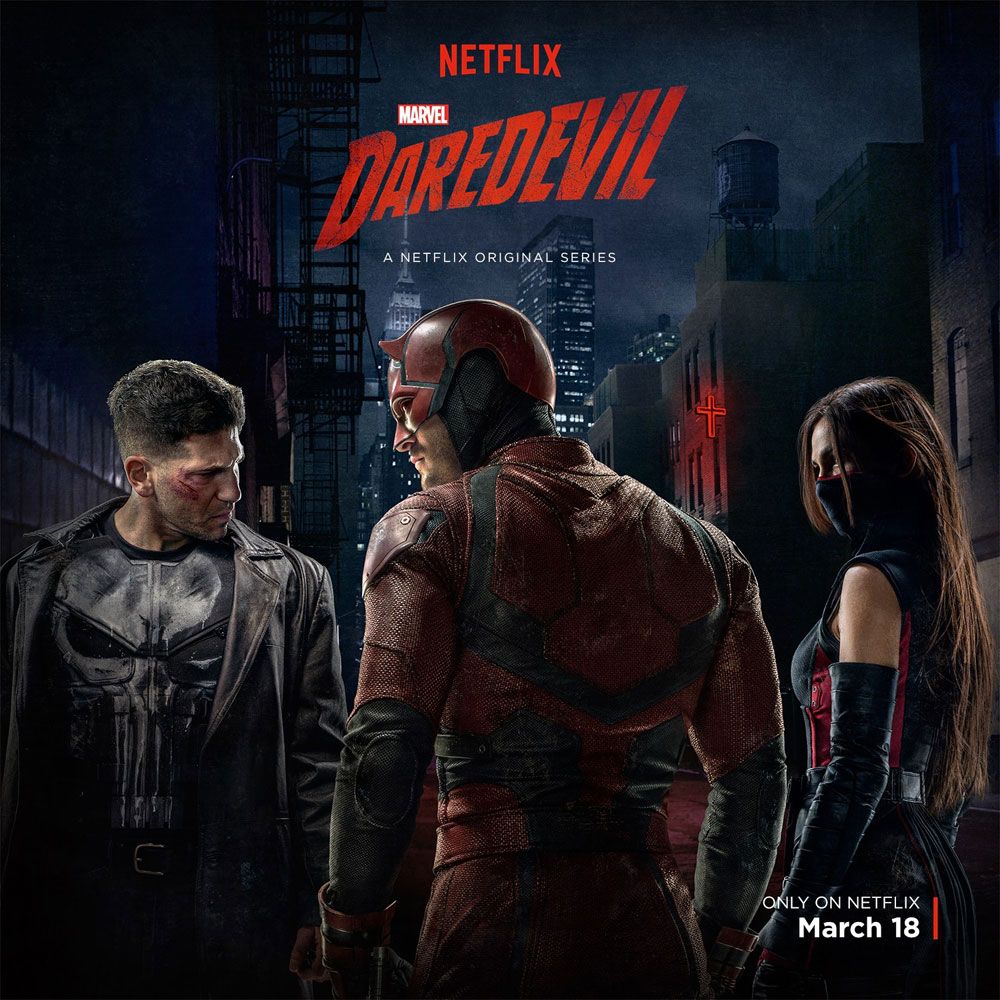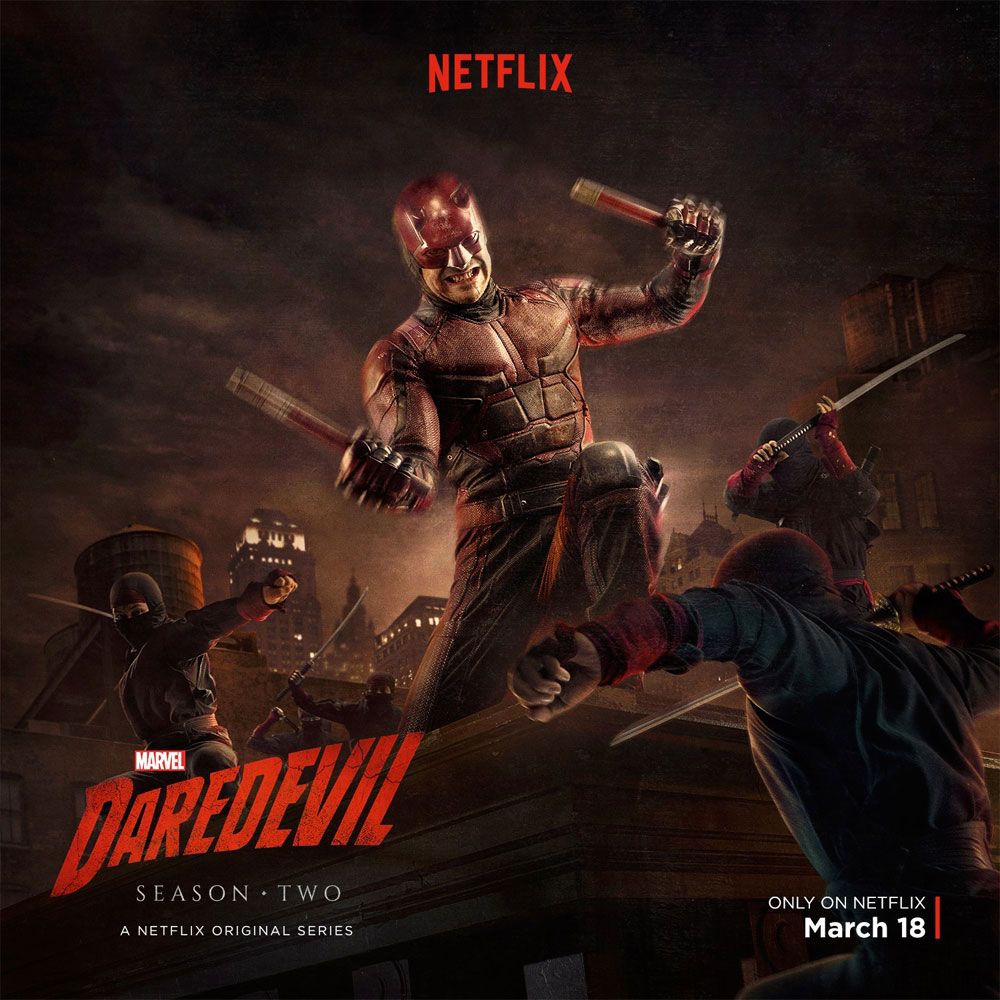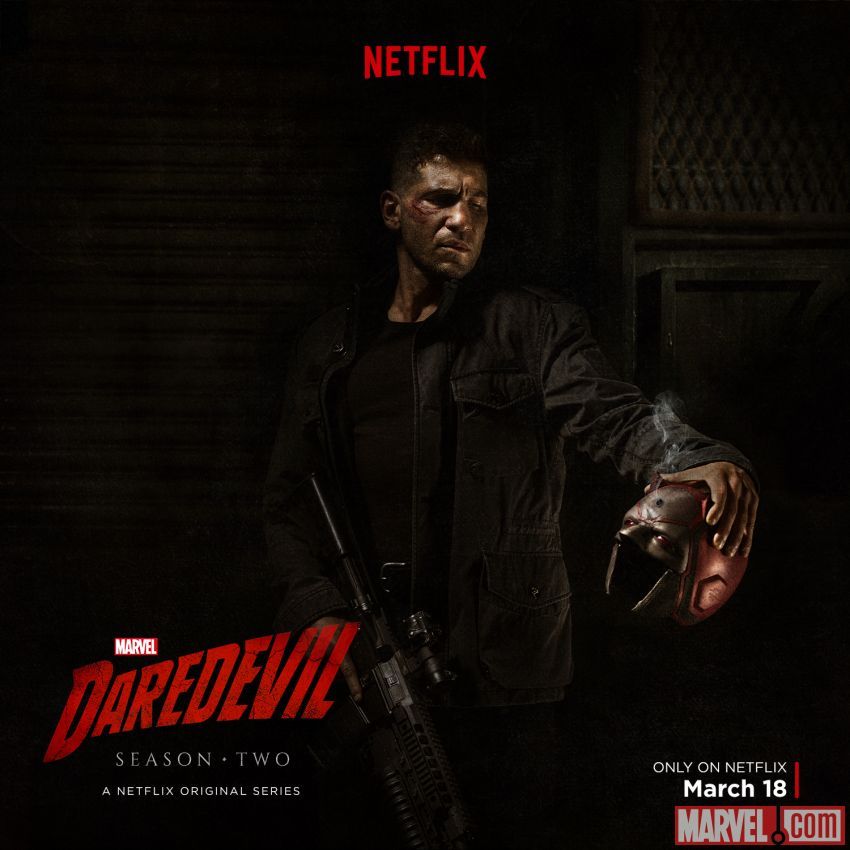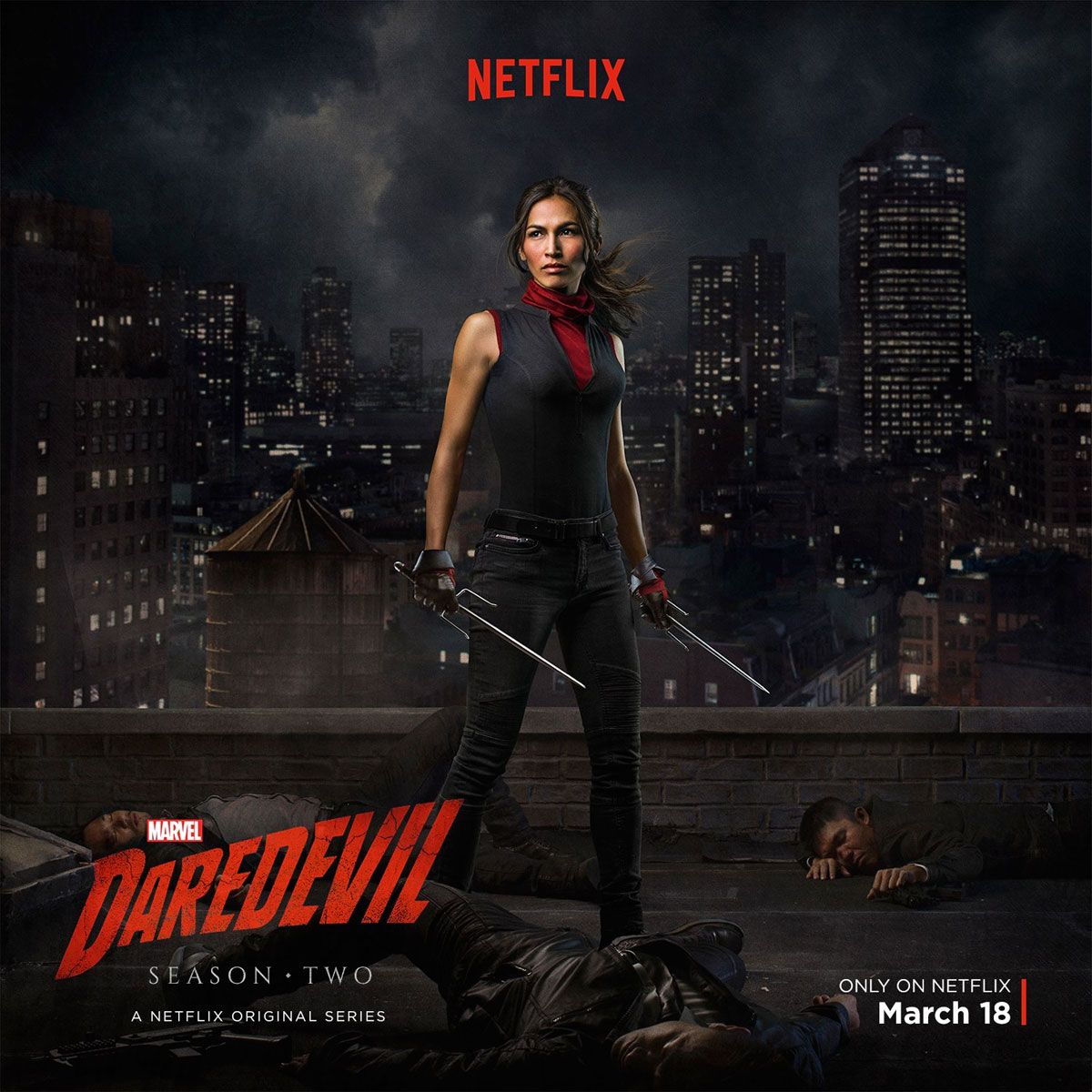"Marvel's Daredevil" arrived on Netflix last year to rave reviews and enthusiastic fan reception. With the high-profile departures of Drew Goddard, who initially developed the show, and Steven S. DeKnight, who served as Season One showrunner, whoever stepped up to continue Matt Murdock's journey had a daunting road ahead.
But when you're writer-producers Marco Ramirez, a veteran of "Sons of Anarchy" and "Orange Is the New Black," and Doug Petrie, who cut his teeth on "Buffy the Vampire Slayer" and "American Horror Story," the transition to running the Marvel Television series in Season Two was as smooth as could be. The fact that they were both part of the writing staff in Season One and took several lessons from the freshmen season was also a big help.
WATCH: War Comes To "Daredevil" In Stylish Final Trailer
The not-entirely-new masters of the Man Without Fear's fate joined CBR News for a detailed look at how they developed their plans for the second season, including dealing with the delayed realities of superheroic costumes, raising the already sky-high bar on stunt sequences and finding the ideal actors to bring The Punisher and Elektra to life in the Marvel Cinematic Universe.
CBR News: Knowing how the audience responded to Season One, what were the things that were chief in your mind to ensure you kept the same sort of spirit and quality? And what were the ways you wanted to evolve the show for Season Two?
Doug Petrie: Well, I think what Drew Goddard and Steven DeKnight did so beautifully and powerfully [in Season One] was explore Matt Murdock through the prism of his Catholicism and the moral weight that he puts upon himself. He's a very, very serious cat, and I love that. I've never seen, not just a superhero show, but even a crime show where one's religion informs your actions and your moral choices so deeply. So that's something that I was certainly intrigued by, in addition to how complicated and morally grey the world can become.
Then, in terms of where to go next, I think that we were given by Marvel Elektra and The Punisher, and so many of the questions of "What's the tone? What's the vibe? How is it going to feel? What can we put Matt through next?" were answered instantly by having those two icons come to play with him and kind of torture and push him. So a lot of those things, I think felt kind of self-evident to us when we started.
What's interesting to me as well is that you got to have some fun last season by delaying the costume reveal. This season, it starts right with Matt as a superhero even in this gritty, urban, realistic world. You enjoyed a similar sort of challenge/opportunity with Elektra and Punisher as far as their iconic comic book visions. What was navigating that like? Having Matt in costume from the get go this time, how did that change things up and how did it spill over into making these other characters come to life?
RELATED: Charlie Cox Says "Daredevil" Is At the "Beginnings of an Identity Crisis"
Marco Ramirez: Just aside from Elektra and Frank for a minute, one of the great freedoms in Season One, which Doug and I worked on, was we've got to imagine it not as comic book or superhero show: it was a story about a guy in the street wearing basically a black Under Armour shirt and do-rag over his face. It was a guy. So we never really felt like we were making a comic book show, and we didn't have to adhere to those rules. Similarly with [Wilson] Fisk. In Season One, he wasn't walking around with the purple ascot and the cane and the white suit. He was just a guy in the back of a car.
One of the challenges in talking about this season was day one, we were like, "Oh wait, shit -- our guy's running around in a suit. We are officially a comic book show now. It happened." So one of the challenges this season was wrangling with that. Saying "Okay, how do we make this like no other comic book show that exists on TV?" Because we're not blind -- we exist in a world where there are several of them. So constantly finding ways to ground this was one of our biggest goals.
Certainly with Elektra and Frank, it's not so much that we set out to write origin stories for these kind of things, but we just wanted the stories to feel organic. And getting Elektra to a point where she is where she is wearing something that would approximate her costume, similar to Frank, getting them to be in the costume and not just the character, we just wanted to take our time with it.
That's one of the benefits of dealing with the Netflix model is we kind of had 13 hours to get them into wherever we go, if we go there. I think there are pictures of Frank in costume they used for publicity -- so yeah, Frank wears the skull.
Petrie: I think in terms of the suit, we never really discussed it overtly, but I think we both understood that we never worked against the suit, you just have to embrace it. I think what really helps us a lot in terms of Matt Murdock is that this is battle armor. This is a guy who got his ass kicked plenty in Season One, and we're not easing up on him in Season Two. And if you're going to take that much abuse, you better have some kind of armor on.
I think that down to the helmet, it makes a certain tactical sense, and I think Charlie [Cox] has played into that beautifully. He's someone who I can see on the stage playing a knight in a similar costume, and he would make it work.
Charlie Cox on "Hallway Scene" Homage in "Daredevil" Season 2
One of the high bars of Season One was the action and the stunt work that was really mind-blowing, especially for television. You certainly rise to the occasion again in Season Two. How did you try to not only match what you did in Season One but push it further and incorporating action into, again, an otherwise fairly realistic, urban, gritty kind of environment?
Ramirez: I would say it goes two fold. On the first half, I think it's a testament to the fight choreographer and the stunts and the directors that we have working on the show. Phil Silvera who did the first season, worked on this season, and he's just fantastic. So in a way, he didn't have to come in and prove anything, he just kind of came in as the same badass stuff he did last season. And the director that we worked with, that we were lucky enough to work with, he's worked wonderfully with all the action that came in and knew, 'Okay, I'm doing some of the best action stuff on TV, and working with some of the best stunt people on TV.' So they just rose to the occasion. That's half of it.
And the other half, I think that for us, the action scenes always come from character. So one of the new dynamics we got to play with this season was, Season One was very much a brawler show. It was about a guy who was a kid when his father was a boxer and he's trying to figure out what it means to be a vigilante and his fight choreography is what it is.
This season, we organically, character-first got to say, "Okay now there's a guy who does kung fu coming into this world. There's The Punisher, and then a lot more artillery used. And on the flip side of it, there's a lot more martial arts being used because of what Elektra is and what her training is. So it's not that we actively set out to say, "Oh, this is what we want to do. Just by design, it felt like well, this is what Elektra needs to do, and this is what Punisher does, this is how they operate in the Marvel Universe." So yeah, we did open it up a little bit, but only really because there was no Punisher and no Elektra in Season One.
Bernthal Says "Daredevil's" Punisher "Is Not Concerned With Doing What's Right"
The show has also been a triumph of casting, and for this season tell me about landing on Jon Bernthal and Elodie Yung as these two very central, very iconic characters. What did they bring to these roles that got you really charged up creatively?
Petrie: Well, the audition process, it's so funny because looking at it through the prism of now, and looking back, both choices feel so inevitable and so singular. And I'll start with Jon.
One of the things that Jon brings is a nose that's been broken 14 times in the boxing ring, so we know he likes to play rough. When he came in to audition, we were pretty blown away. He's not only a lovely guy, and not only one of the hardest and most dedicated actors we've ever had the pleasure of working with, I mean, he takes it so seriously and he works so hard and we just so deeply appreciate that.
But he embodied Frank Castle -- not so much The Punisher, but Frank Castle -- and his toughness, and his vulnerability, and all his shadings, and his hurt, and his backstory, and so much of it was unspoken. I think that Jon has this very deep undercurrent of subtext running through him as an actor, and really he just channeled Frank in a way that made things very easy.
And as for Elodie, there are many ways to go with Elektra because she's such a complicated person. Elodie brings an incredible, fluid physicality to the role. A lot of her stunts are really her doing it. Normally, we could take or leave that, but in this case, it's so much who she is, and that homicide and sociopathy and a little sexual thrill from violence runs through her.
When Elodie showed up and we discussed these things, first her eyes went wide and said, "You guys are sick." Then she completely embraced it. I mean, her learning curve is so off the charts, and she so embodied Elektra from moment to moment and episode to episode, that it was thrilling. She just grew into it in a shockingly quick time.
RELATED: When "Daredevil's" Elodie Yung Is In Costume, She's "In Elektra Killing Mode"
With Elektra, this version that I've seen in the first seven episodes reminds me very much of the wild, unpredictable early-era Elektra that we see more in Frank Miller's "Daredevil: Man Without Fear" miniseries then the ninja assassin as first introduced in the comics. Is that where the influence came for our introduction to Elektra?
Petrie: Well, it's interesting you bring that up. I think "Man Without Fear" was a post-introduction origin story of Elektra to a degree. Here's a young woman and the diplomat's daughter and all of that. We knew that based on the kind of template of Season One, we realized that introducing our characters and creating our characters was very successful and something that Marco and I very cautiously wanted to continue. So yeah, we wanted to build it from the ground up. Then having Elodie was such a wonderful wildcard where, how do you get her started? I think we found a way in that she feels both familiar and new all at the same time. I think where it was fun working with Elodie in this creation was, how much of a soul does Elektra have? And how comfortable is she with that? That's something that we explored very consciously throughout.
Why do you think Daredevil works so well as a character, and why has he drawn so much great work out of the various creators that have worked on him?
Ramirez: One of the reasons I love Matt Murdock is it's never easy for him to be Daredevil. Compared to some other characters in other comic worlds, whether or not it's financial access or whatever it is, or power, it's always hard but he gets up every morning and does it. And that, to me, is what drug me to him.
It's never as easy as it is for, say, someone like Tony Stark to be Iron Man. It's really hard. Daredevil has trouble making the rent and being Daredevil. That's just so easy and so universal. That's one reason I think the show is such a hit. People can recognize that. They know that like, I know what that is, because it's hard to be a parent, and also get up in the morning. It's hard to be a doctor and get up in the morning, or a cop, or anybody.
Petrie: And the only thing I would add to that is that we are both former New Yorkers -- and you're never really a former New Yorker. Speaking for myself and for both of us, we love New York, and we love what it is, and what it makes us feel, and what it stands for, and what it has been, and what it can, be and all its flaws, and all its glory, and the way it makes us feel. So I think that for us to a degree, it's so rare to get to write a bloody-knuckled love poem to New York city, and that's what Matt Murdock brings out for a lot of people.
"Daredevil" Season Two is now streaming in its entirety on Netflix.

